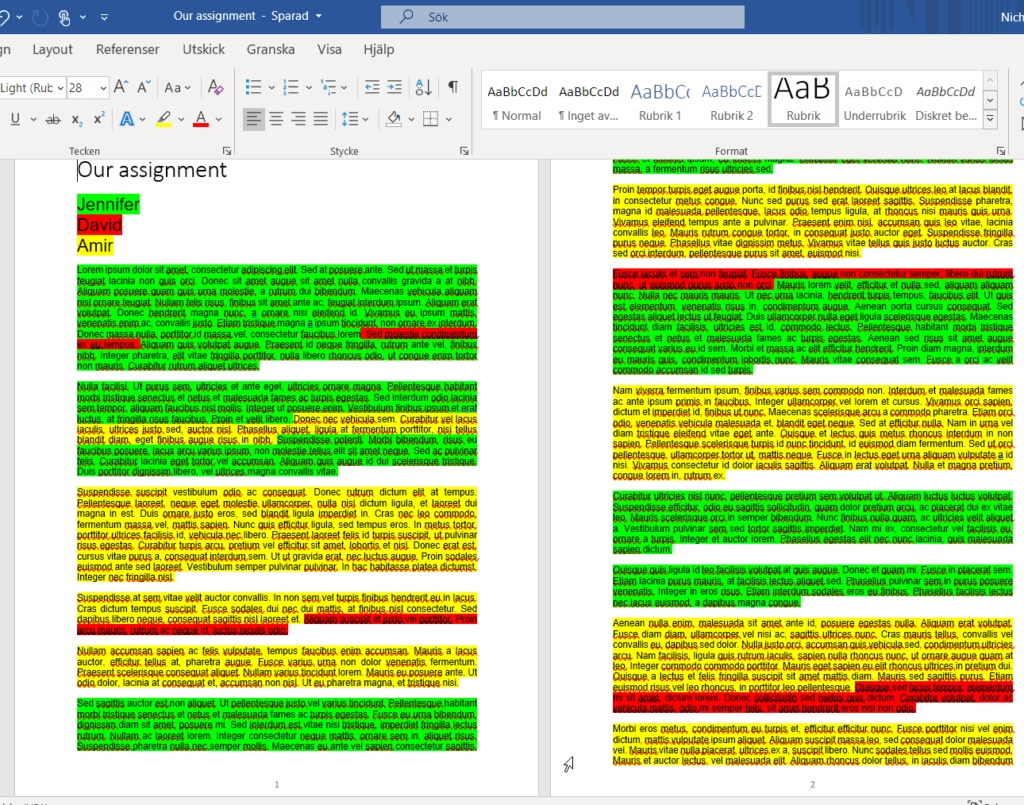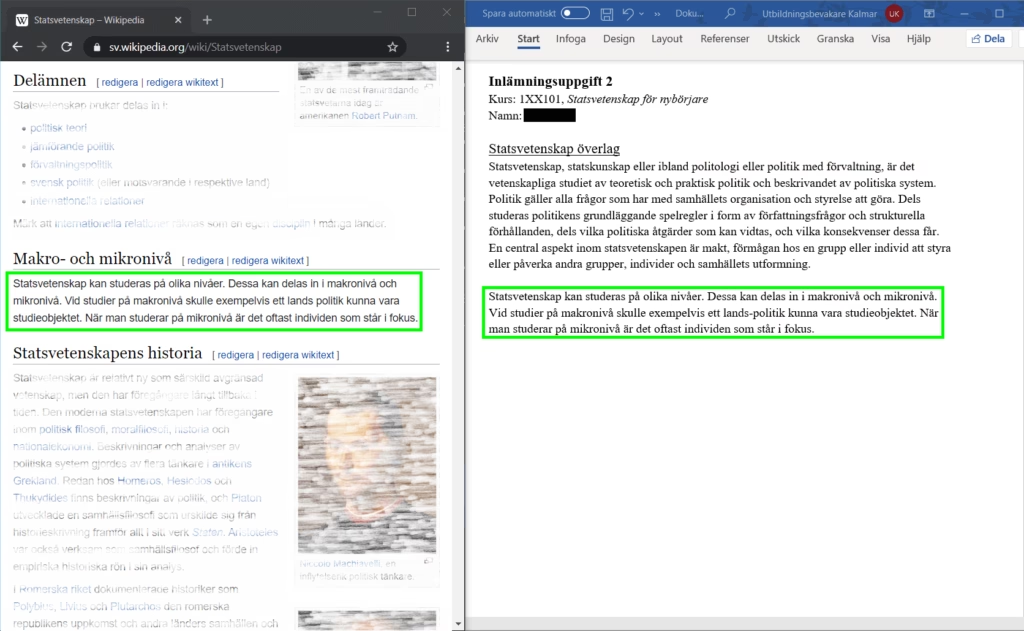Fusk & Plagiat
Reported disciplinary cases:
- 2025: 107 (250903)
- 2024: 186
- 2023: 144
- 2022: 104
- 2021: 173
- 2020: 114
- 2019: 105
- 2018: 65
- 2017: 48
Your responsibility
It is your responsibility to know, understand and follow the rules regarding cheating and plagiarism. Teachers are surprisingly good at spotting it and are required to report all suspected cases of cheating and plagiarism, which can lead to a student being suspended for up to six months. The Student and PhD ombudsmen can give advice and support.
Cheating and attempting to mislead
Cheating, i.e. attempting to mislead or to plagiarize includes...
- Using text or other media from books, web pages, articles, another students’ work etc. without proper references or citations.
- Improper use of citations.
- Relying too heavily on other peoples’ work, even if you do make proper references and citations.
- Submitting someone else's work as your own.
- Bringing/using unallowed books, papers, notes, calculators or other aids to an exam.
- Having unallowed notes in books you are allowed to bring to an exam.
- Wearing or using a smartwatch or phone during an exam (regardless if it’s powered off or not).
- Cooperating on assignments with other students in ways that are not described/allowed in the assignment instructions.
- Sharing your individual assignment with others before deadline.
- Submitting assignments that are bought or given to you as if they were your own.
- Having your name on an assignment you did not make substantial contributions towards, writing somebody else’s name on an assignment they did not contribute towards or submitting work in another student’s name instead of your own.
- Changing answers in an exam after they have been marked/graded in order to get a better score/grade.
- Fabricating data, statistics, interviews or other materials.
- Intentionally misinterpreting other people’s texts, statistics quotes etc. to make a point.
A student who intentionally tries to mislead the examinor in an exam by for example using unallowed aids, notes in books, submitting work that has been bought or that the student hasn't contributed to, is guilty of cheating by attempting to mislead.
Plagiarism
To plagiarize basically means to steal someone else's work (usually text, reasoning, sounds or images) and presenting then as one's own without gicing proper references to the source and author, composer or artist etc.
Using or relying on someone else's work too much can also be considered plagiarism even if you make proper references or quotations.
It is not allowed to use your egna tidigare arbeten utan att tydligt ange att det har lämnats in tidigare. Argumenten handlar bland annat om att man inte ska kunna få poäng eller studiemedel för samma arbete flera gånger.
It can be hard to dertermine exactly what does and does not constitute plagiarism, but when teachers are uncertain whey will often rely on the results from text-matching tools such as Urkund.
Find out more about reference management and plagiarism at Writingguide.se and Refero
Testa dig själv!
Plagiat eller inte? 1 (In Swedish only)
Plagiat eller inte? 2 (In Swedish only)
If you need help with academic writing we strongly suggest that you contact the university library´s Academic Support Centre . They offer excellent support for how to reference and write academic texts!
Disorderly conduct
A student who prevents or disrupts ordinary activities (i.e. lectures, seminars, lab work, exams, work placements, etc.) risk being reported for disorderly conduct. This also applies in the university library’s facilities.
Harassment
A student who harasses another student or staff member may have to face the Disciplinary Board on charges of harassment.
Even a student can report another student for cheating/harassment..
Disciplinary measures
Attempting to cheat during examination can lead to disciplinary measures being taken. An invigilator, teacher, examiner or similar is always required to file a report if they suspect that something is awry. If an invigilator suspects that you have tried to cheat at a written exam you will be informed about why it is suspected and that it will be reported. You are still allowed to finish the exam. The invigilator will then notify the course co-ordinator and file a report.
If you are suspected of cheating at an exam or other assignment and staff finds enough reasons to report you, the matter will be forwarded to the university´s Disciplinary Board. It will be handled as quickly as possible so that you don’t have to worry about it longer than necessary. All matters are handled under rule of law as to protect your personal integrity. You will be informed that there is cause for suspicion and get a copy of the report that has been filed against you, as well as information about what will happen next. You will also get an opportunity to submit a written statement to give your perspectives on the matter. Your case will never be discussed with people not involved in it.
Once a report has been filed to the Disciplinary Board, the vice-chancellor and the legally qualified member of the board will decide to either:
- Leave the matter dismissed without further actions
- Issue a warning to the student
- Forward the matter to the Disciplinary Board for decision
The Disciplinary Board consists of the vice-chancellor, a legally qualified member, a teacher’s representative and two student representatives. You and the staff member who reported you will be invited to attend the board meeting, and even though it is highly recommended to attend, attendance is not mandatory. The board will handle the matter regardless of whether you are there or not.
Both the reporting staff member and the student will be able to explain themselves at the meeting, and the board will likely ask a few follow-up questions. When both parties have been heard they will be asked to leave the room while the board discuss the issue and reach a decision.
The student is informed of the decision immediately after it is reached, and will carry one of three consequences:
- To leave the matter without further consequence
- You get a warning.
- You will be suspended from your studies for a period decided by the severity of the offence ( at most six months but usually 4-8 weeks).
Consequences of a suspension
- You will not be allowed to attend any lectures, labs, seminars or other forms of scheduled sessions during the suspension.
- Your contact with teaching staff will be restricted.
- You will not be allowed to take or re-take any exams during the suspension.
- You will not be allowed to register for or start new courses during the suspension.
- You will not receive any money from CSN during the suspension.
- Your student user account will be temporarily closed to precent you from accessing services to which you have to log in (e-mail, MyMoodle, public computers, network services, databases etc.)
- You will have no access to the Academic Support Centre (Studieverkstaden).
- You might not be able to start or continue your placement, internship or exchange semester during the suspension.
- You might not have the necessary credits or prerequisite courses to take your next course.
- The suspension might prevent you from continuing your studies the following semester.
- You risk losing your student apartment if you don't take enough courses/credits.
- You might lose scholarships or grants.
- You might be forced to take a year off or get your degree later than planned.
Scenarios
The Group Assignment
Tycker du att David ser ut att ha varit delaktig i grupparbetet nedan?

We have all been there, in a group where everybody doesn’t participate or equally participate. But did you know that it´s not allowed to turn in a paper signed with your name unless you have actually written it? This is attempt to decieve and could lead to the student getting suspended.
We have all been there, in a group where everybody doesn’t participate or equally participate. But did you know that it´s not allowed to turn in a paper signed with your name unless you have actually written it? This is attempt to decieve and could lead to the student getting suspended.
Asking a friend
Do you recognize yourself in the mobile conversation below? Is this cheating?

Asking a friend for help on a home exam, or perhaps being the one who gets the question, many people probably recognize themselves in. But what did the instruction look like for your examination? Was it an individual task? How is the information requested here then handled? Will the student copy the text and put it in their own submission or is it used to get help with where to find the answer? Asking for the answer to a question leaves some thoughts in our opinion and it is important for you as a student to know that this can end up in the Disciplinary Committee. If the answer is copied and then included in the next student's home exam that is submitted before you submit yours, how does the teacher view the similarities in your submissions?
Copy & Paste
“I only copy a small paragraph to the text. One small thing will not be noticed. No reference in the text? Oh well, one time does nothing in the whole assignment .. "

When it becomes stressful with the submission, it is not uncommon for a small piece, directly copied, to slip into a work in the hope that it will not be visible among all pages. But is it worth not being able to graduate just because you did not write a reference?

